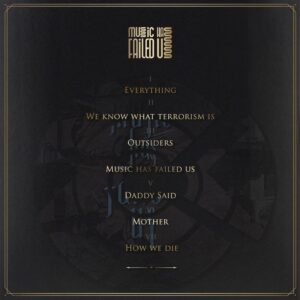Abu Ibrahim (IB) Plays Voice of Conscience in Music Has Failed Us
Michael Chiedoziem Chukwudera
The spoken word poetry album, “Music has Failed Us” is the debut album by the poet Abu Ibrahim who goes by the stage name, “IB.” Along with other poets from around the world, they are currently advocating that the Recording Academy create a distinct category for poetry at the Grammys. In this thought evoking album, he attempts to employ his poems as tools to stir an effect towards positive change and redefining society.
In the beginning of his spoken word poetry album, Ibrahim introduces himself, “Everything I own, I carry through words,/ they breathe on the flesh of my tongue like a prophecy ever fulfilling… They say I am larger than life/ for I am constantly choosing things the world can’t take away from me…” In this introduction, he espouses his person in the philosophy of a poet who makes himself from nothing and hence has nothing to lose. And as such, the world becomes his for the making. Abu Ibrahim sets the floor for an album which is a prologue by a lone voice which intends to speak to the conscientious aspects of the existence of the society from which he comes.

The topics which Abu Ibrahim (IB) explores in “Music Has Failed Us” are terrorism, juvenile delinquency, masculinity, and it especially cries out against societal malevolence which is something so close to the heart of Nigerians considering how #EndSARS panned out last November.
Abu Ibrahim displays a crisp awareness that all is not well in his society, and as he speaks up, his voice is intensely layered with his emotions and it is as though like a town-crier he is announcing the decadence that has taken place in society, but also as a critic, lamenting and forewarning of the consequences if the situation is not remedied.
Throughout the entire album, Ibrahim makes a distinction between the ideal society, as one which exists inside our imagination and partly in the past; and the reality which is the one whose malevolence we suffer. And in reality, the land of our dreams is locked away in the past or in imagination. And in the piece, titled, “Outsiders” the poet referred to the dreamers of a better society as the outsiders. And what differentiates them from the insiders is their audacity to dream and imagine a better society. “A land desperate to be born sits in our imagination…”
In the title piece, “Music has Failed Us,” in a performance spanning over 8 minutes, Ibrahim takes us down a nostalgic lane where even though Nigerian music had not yet attained its present global status, it was a cradle of better and more conscientious messages. But now that the times have been kind and commercially, the sound has been better recognised, the sim of musicians is no longer to pass conscientious messages, but recognition and fame, hence the music has not helped put society on the path it was supposed to. Perhaps in this piece, and to some extent, the album itself, the poet is a bit too idealistic about the past considering that Nigeria has always been decadent albeit in different measures, but one cannot fail to see the message which he passes in his proclamations.


Abu Ibrahim also takes an unlikely dive into the topic of rigid masculinity in the piece titled, “Daddy Said” which is my favourite. The piece interrogates the kind of masculinity which society confines men to, from the lens of the story of his father who came from a polygamous home where they worshiped their father. It explores how coming from a family ruled by a patriarch whose humanity was far removed from the family resulted in his father becoming a man who did not know how to connect with his humanity. In one part he says, “Daddy picked up the bricks of a broken childhood,/ and built himself into an emotionless wall/ Daddy’s still a boy, still learning to hold conversations…/ still responds in shy silences whenever I tell him I love him, he blushes. Daddy said, his father was so good at making mortars, no wonder the only gifts his pestle-like fist gave were poundings.”
The next piece is about motherhood. In “Mother” the poet extols the virtues of motherhood, as an arbiter of care, as a source of endless love, of solace, as home. And in the final piece, “How We Die” mother is juxtaposed with Nigeria as a metaphor which against its original design has become a trigger-happy menace targeting its young people. And here the project completes its cry-out about the malevolence of the society which the poet writes about.
Abu Ibrahim’s “Music Has Failed Us” is an unbridled criticism of society. It doesn’t romanticise the problem even if sometimes it is idealistic about the past. It is an idealist’s manifesto. In 2021 it is exactly the kind of voice more people should pay attention to as it stirs our conscience towards the kind of changes we need to effect, and the ideal direction which we should head towards.




